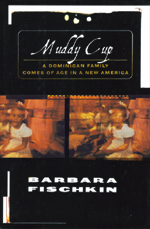

Muddy Cup
by Barbara Fischkin
Non Fiction / Scribner 1997
Muddy Cup chronicles fifty years in the life of a family of Dominican immigrants, as its members move from a palm hut near Puerto Plata to Queens, New York. The book, based on a Newsday series which won a coveted Livingston Award for International Reporting, has become a classic among modern immigration social histories. An excerpt can be found in Connections: The Dominican Republic, a textbook published by the Yale University-affiliated Teaching for Change. A paperback version of Muddy Cup and a Spanish language edition translated by Rakel Terceno will be published by Athanata Press.
Editorial Reviews
From Library Journal
The original assignment for Fischkin, a staff writer for Newsday, was a year-long series on an immigrant family in New York City in the 1980s. This compilation of that series is the culmination of a decade-long relationship between the writer (herself the daughter of immigrants) and the Almonte family. The story originates in the Dominican Republic and relates life in the campo through three generations of Almontes. Fischkin narrates the dreams, struggles, and perspectives of each of the Almontes as their family is fragmented and gradually reconsolidated on these shores. She gives an intimate account of immigrant life in contemporary America, with all the bureaucratic quagmires, language barriers, and transformations that are involved. This masterfully woven tale strikes at the heart of the American identity, still as much a process of becoming as it is of being. Recommended for general readers.Tricia Gray, Miami Univ. Oxford, Ohio.
Copyright 1997 Reed Business Information, Inc.
Booklist
Missing in debates on immigration policy are the faces and voices of those who come to the U.S. and struggle to find new homes here. Fischkin, a daughter of Eastern European immigrants, wrote a prizewinning, yearlong series for Newsday in 1986 about a family of Dominicans in New York City; now, 10 years later, she offers a portrait of that family, the Almontes, in their old country as well as their new one. Patriarch Javier grew up in an impoverished nation under the thumb of El Jefe, dictator Rafael Trujillo; unable to support his family, he heads north, eventually bringing his family to Queens, where his children gradually learn the ways of their new country. Fischkin fills in details of Dominican history and of her decade-long relationship with the Almonte family and mulls similarities and differences between her mother's experiences as an immigrant two generations ago and those of the Almontes. A vivid narrative that brings to life an often invisible immigrant group. Mary Carroll
From Kirkus Reviews
A sensitive and nuanced account of one Dominican family's immigration experience. In the mid-1980s, Dominicans were the fastest-growing group of immigrants inNew York City. Newsday reporter Fischkin's account of the Almonte family's move to New York City began as a year-long newspaper series and ended as a decade-long book project. The family members are rendered as fully and refreshingly human, defying both the negative stereotypes and the heroic cliches that so often clutter media portrayals of immigrants. Javier had been dreaming of leaving his native town, Camu, since childhood. But his sister Marta was the first of the Almontes to go to New York, abandoning her young children to do it. She eventually made it possible for many of the rest of her family to come over, both by sending them money and by finding them jobs when they arrived. In 1986, Javier's wife, Roselia, was forced to decide between joining Javier, who had already moved to Queens, and staying with her children--immigration officers would not issue visas to all three children, claiming Javier would not be able to support them. So Roselia took the oldest and left the two younger ones behind. Here Fischkin's reporting becomes part of the story--a congressman reads about the divided family and arranges visas for Cristian and Mauricio. But Cristian never really learns English; she watches too much TV and breaks her father's heart by moving back to the Dominican Republic with her much-older boyfriend. Mauricio, the youngest, wants to be a writer. By the book's end, he's in graduate school studying Spanish literature. Fischkin smoothly and gracefully tells a complex tale by interweaving parents' and children's vastly different perspectives, as well as an account of the Dominican Republic's troubled history. A human side to currrent policy debates on immigration--well timed and well told. -- Copyright ©1997, Kirkus Associates, LP. All rights reserved.
Copyright © 2008 Barbara Fischkin
Photography by Christopher Zach